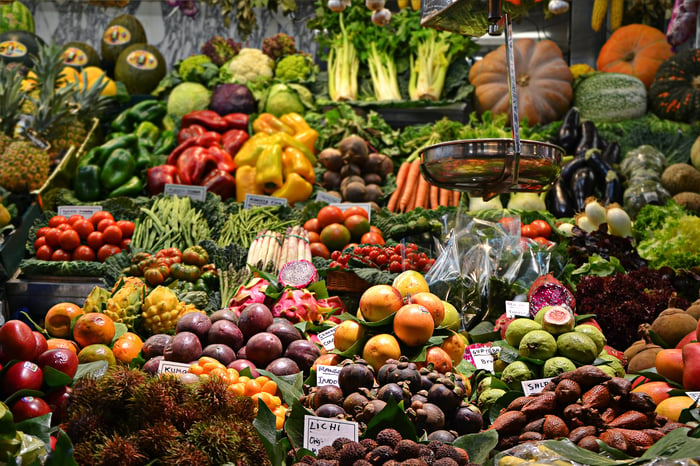
Minerals are chemical elements organisms need to perform functions necessary for life. In this article, we share recommendations and tips for getting sufficient minerals on a vegan diet. Do check out our previous article, Essential Vitamins for Good Health too. Vitamins work hand in hand with minerals for your body to function normally.
Calcium
Builds and protects bones and teeth
Helps with nerve and muscular system function
Maintains healthy blood pressure
Plays a role in hormone secretion and enzyme activation
- Recommended Daily Intake (RDI) for adults: 1,000 mg-1,200 mg
- Food sources: Chia/sesame/sunflower seeds, fortified plant milk, almonds, tofu, dried figs, edamame, and sweet potatoes.
Magnesium
Needed for various chemical reactions in the body
Works with calcium in muscle contraction, blood clotting, and regulation of blood pressure
Preserves bone and teeth structure
Maintains healthy brain function
- RDI for adults: Men: 400-420 mg, Women: 310-320 mg
- Food sources: Pumpkin, spinach, beet greens, black beans, flaxseeds, almonds, cashew nuts, tofu, avocado, and dark chocolate.

Iron
Helps hemoglobin (red blood cells) and myoglobin (muscle cells) transport oxygen around the body
Needed for chemical reactions in the body and for producing amino acids, collagen, neurotransmitters, and hormones
- RDI for adults: Men: 8 mg, Women: 15-20 mg
- Food sources: Beans & lentils, tofu, baked potatoes, quinoa, cashews, dark leafy greens, broccoli, whole-grain, and enriched bread.
Potassium
Regulates bodily fluids
Maintains healthy circulation & muscular system
- RDI for adults: 3,500-4,700 mg
- Food sources: Beet greens, cooked greens, zucchini, cucumbers, edamame, yams, sweet potato, soybeans, avocado, and mushrooms.

Zinc
Helps form enzymes and proteins
Enables cell regeneration
Frees vitamin A from its stored form in the liver
Maintains a healthy immune system
- RDI for adults: Men: 9-15 mg Women: 7-12 mg
- Food sources: Chickpeas, lentils, beans, tofu, walnuts, cashew nuts, chia seeds, ground linseed, hemp seeds, pumpkin seeds, wholemeal bread, quinoa, whole grains, and fortified cereals.
Iodine
Part of the thyroid hormone, which regulates homeostatic functions and influences nerve and muscle function, reproduction, and growth
Regulates metabolic rate and protein synthesis
Reduces risk of goiters (enlarged thyroid gland) and a congenital thyroid disorder
- RDI for adults: 140-150 mcg
- Food sources: iodized salt, seaweeds, fruits, and vegetables.

Pay extra attention to these minerals
Possible insufficient iron intake
You may be at risk of an iron deficiency on a vegan diet as you only consume non-heme iron (found in plant foods) which are harder for your body to absorb than heme iron (found in animal products). As a result, the recommended iron intake for vegans and vegetarians is up to 1.8 times more than omnivores. To meet this threshold, you should eat iron-rich plant-based foods regularly. These foods include whole-wheat bread, cereals, pasta, quinoa, oatmeal, avocado, cooked spinach, and legumes.
Moreover, pairing iron-rich foods with ingredients rich in vitamin C enhances the body's non-heme iron absorption by up to sixfold. Many vegetables are both high in vitamin C and non-heme iron, so it should be relatively easy to meet your iron intake requirements. Check out iron in the Vegan Diet by The Vegetarian Resource Group for such food recommendations. You can also consider iron supplements to supplement your daily diet.
Best rated iron supplements on abillionveg are Deva Vegan Chelated Iron, Solgar Gentle Iron, and Veglife Vegan Iron.
Possible insufficient omega-3 fatty acids
Omega 3-Fatty Acids are essential for the following reasons. They help maintain heart health, aid in blood clotting, and are an integral part of cell membranes. However, these are essential fats that our bodies can't produce on its own. They're separated into three main groups, Eicosapentaenoic acid (EPA), Docosahexaenoic acid (DHA), and Alpha-linolenic acid (ALA). The former two are dubbed 'marine omega-3s' as they're obtained from fishes. ALA, on the other hand, is found in many vegetable oils and nuts, making it commonly present in vegan diets.
ALA from foods can be converted into EPA and DHA by the body, but at low conversion rates, and these conversion rates vary from person to person. Despite this, vegans and vegetarians have lower rates of heart disease and less arterial stiffness than omnivores. This suggests that they have better heart health than omnivores, which could contest the need for EPA and DHA consumed directly from food.
Additionally, empirical studies about the levels of omega-3 fatty acids among vegans and fish-eaters in 2010 by European Prospective Into Cancer and Nutrition shows that although the intake of EPA and DHA is substantially lower in vegans compared to fish-eaters, the plasma levels of EPA and DHA in both groups are approximately the same. This implies the possibility that vegans convert more ALA into EPA and DHA to make up for the lack of EPA and DHA in their diets.
However, there's still an ongoing debate about whether or not vegans get sufficient omega-3 fatty acids from their plant-based diets alone. The best way to ensure you get adequate omega-3s is to supplement with microalgae DHA and EPA. The DHA and EPA present in fishes comes from the algae that the fishes consume, so going right to the source, algae is a viable way to obtain DHA and EPA. It's also good to note that long-chain omega-3 supplements from microalgae are recommended for infants or pregnant or breastfeeding mothers.







